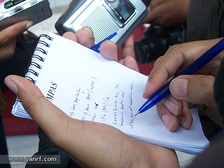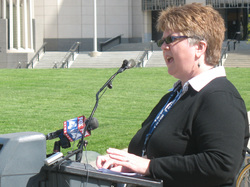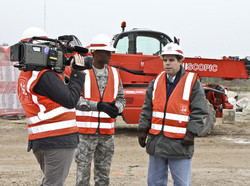 You may be tempted to pitch your latest widget as a great subject for a media interview. It's a new product that will do wonders, you think. That's the wrong approach. When it comes to effective media relations and public relations, stop thinking about the product or your company. Stop thinking about YOU. Think, instead, about the viewers, listeners or readers of the media you're trying to reach. What do they think? What do they need? What are they most interested in learning? Put yourself in their shoes. Here's why.
0 Comments
 The best press conference is the one that results in the best press coverage, in terms of both number and tone of stories. What many people overlook are the details that it takes to get those results. Follow these eight steps and you'll improve your odds tremendously. 1. Select a newsworthy topic. The Media aren't there to promote you. They want news. 2. Choose a good backdrop. Holding a press conference on location (in front of the school, in a classroom) is almost always more effective than a conference room.  What happens when you go from conducting media training for experts, top officials and elected leaders to getting interviewed, yourself? That was the situation here at Mack Communications recently, when a reporter at Ragan's PR Daily called the office to get our assessment of the public relations battle in the Chicago teachers strike. Vice President Wes Bleed ended up handling the interview and was quoted throughout the story. Have a look to see how we provided insight and perspective into what became a national news story. Read the full story here.  When you have the opportunity to speak to the Media, it's easy to get caught up in the moment. Questions such as, "How do I look?" become more important than, "What should I say?" To help bring you back to your main objective, which is to get your story told in the best possible light, it's helpful to think of what sound bite you want to appear on radio or television or what quote you want to read in print. So, before you begin the interview, have one or more "bites" in mind that you'll sprinkle throughout the interview. Sound bites are the key informational or influential nuggets you want readers, listeners or viewers to take away from the news story. You want them to see and hear your point of view. Here's one technique. |
tags
All
Archives
March 2019
|
Photos from Meet the Media Guru, Joseph.Morris, BoldContent, MDGovpics, Grzegorz Łobiński, Mr Moss, North Charleston, ITU Pictures, wistechcolleges, .v1ctor Casale., www.audio-luci-store.it, katielips, editor64, NeighborLink Fort Wayne, AMagill, timsackton, MyFWCmedia, Matt J Newman, Mr.TinDC, Skley, mikecogh, othompsonski, wayne's eye view, Elvert Barnes, woodleywonderworks, North Charleston, MoBikeFed, flossyflotsam, North Charleston, NYCDOT, US Mission Geneva, jjandames, aalborgstift, BurnAway, A. Germain, North Charleston, NCDOTcommunications, IAEA Imagebank, The Chapman Cultural Center, hitsnooze, Wiertz Sébastien, charliekwalker, cliff1066™, TheeErin, woodleywonderworks, dane brian, Aramil Liadon, 2010 World Wheelchair Basketball Championships, Ty Nigh, freddthompson, Nadia Szopinska, west.m, stormwarning., Bright Meadow, Giorgio Montersino, Chris Erwin, Aplomb, jfingas, joce01_y, Massachusetts Dept. of Environmental Protection, Kevin Walter, Andrew Feinberg, Yan Arief, kellypretzer, Korean Resource Center 민족학교, veDro - l'Italia al futuro, crdotx, US Mission Geneva, Joe Shlabotnik, esocialmediashop, Stephen Cummings, CarbonNYC, sidewalk flying, MoBikeFed, marksdk, Marco Raaphorst, Saleel Velankar, adactio, edkohler, World Economic Forum, USACE Europe District, stereogab, Florin Rosoga, MikeSchinkel

